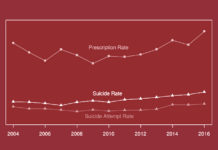Adolescent Suicide and The Black Box Warning: STAT Gets It All Wrong
STAT recently published an opinion piece arguing that the black box warning on antidepressants has led to an increase in adolescent suicide.
It is easily debunked, and reveals once again how our society is regularly misled about research findings related to psychiatric drugs. STAT has lent its good name to a false story that, unfortunately, will resonate loudly with the public.
Suicides Are Increasing – And So Are Antidepressant Prescriptions
Disturbingly, our study and others reveal that the black box warning is now ignored in many countries, since antidepressant prescriptions for children are on the rise again. Despite increasing certainty that antidepressants are ineffective and likely cause suicidal behavior in young people, psychiatry continues to claim that they reduce suicide risk.
A Time For Rain: Teaching Our Children About Sadness
The only way out of the epidemic of feeling-people-turned-medicated-psychiatric-patients is to rebrand and reframe feeling as a cultural collective. And I believe it starts with our messaging as parents and our orientation toward shadow elements like anger and sadness. We have to model a conscious relationship to our own dark parts, and we have to show our children what it looks like to move through these spaces. Feelings can be messy, wild, and sometimes ugly to our constrained sensibilities.
The Scientism of Childhood and Adolescent Depression
When I was training to be a child psychiatrist in the mid-1990s, childhood depression was considered to be rare, related to adversity, and generally unresponsive to pharmaceutical treatment. Since then much has changed. The psychiatrization of the pain and struggles involved in growing up has caused considerably more harm to young people than good. I believe the science is on my side in this conclusion.
Rethinking the Nature of Our Woes
Parents must inform themselves about the flaws in the current paradigm if they are to have any chance of thinking sensibly about what might be distressing their child. Toward that end of providing information about those flaws, I interviewed Richard Hallam, author of the new book Abolishing the Concept of Mental Illness: Rethinking the Nature of our Woes.
The Diseasing of Defiance
Is every defiant child a freedom fighter? Of course not. Disrupting your fourth grade class is not the same as embarking on the underground railway. But is oppositional defiant disorder a label meant to subjugate and to serve the needs of the authorities? Yes, absolutely.














